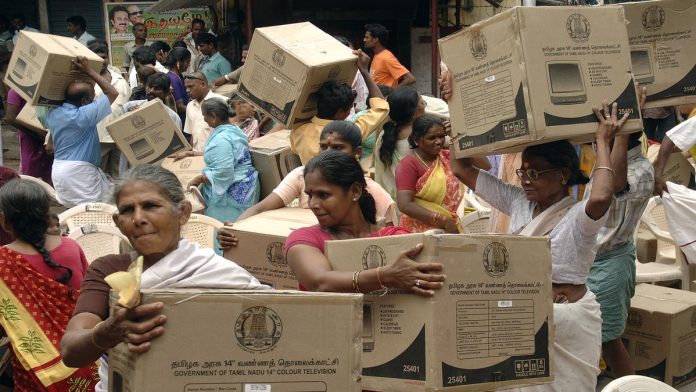Dr Satyavan Saurabh
A series of promises such as free electricity, free public transport, free water, and waiver of pending bills and loans are often considered freebies by political parties. Distribution of “freebies” has become an integral part of election campaigning in India. The culture of freebies has reached such dangerous levels that most of the electoral agenda of some political parties, as a deliberate strategy, is based only on freebies, clearly sending a message to the voters that if the political party wins they will get lots of free stuff. This is indistinguishable from election campaigns where politicians use free water, electricity, ration, food, TV, etc. as shortcuts to woo voters rather than setting long-term development goals like employment guarantees, state support for education and health facilities, and other welfare schemes. Promises of laptops, tablets, bicycles, scooters, gas cylinders, and public transport.
This raises many questions, including whether such a strategy of manipulating the minds of voters and giving freebies to come to power is ethical, legal, and acceptable in a democracy. Subsidies and freebies increase the fiscal deficit and put pressure on government revenues, further increasing the deficit. Freebies badly affect the decision-making power of voters. Giving loan waivers as a gift may have unintended consequences, such as ruining the entire debt culture and obscuring the core question as to why a large section of the farming community continues to fall into the debt trap. The economic turmoil in Sri Lanka is an example of the ill effects of freeloading politics.
This has the potential to hinder strong financial health. This forces states to divert resources from welfare schemes towards politically motivated agendas. Unreasonable freebies are against free and fair elections and will hinder democracy. The culture of freebies will automatically lead to irresponsibility towards natural resources and overuse of resources and this will cause more damage to the environment. Like free electricity, free water, etc. In a mature democracy, a political party is only indebted to good and corruption-free governance, while good governance is difficult to give, free promises are easy to fulfill. Indian voters are attracted to politics of freebies rather than rational economic management, which has been proven time and again in Punjab, Rajasthan, Chhattisgarh, Jharkhand, and Delhi. Freebies worth Rs 55,000 crores are driving Punjab, already the most indebted state, towards bankruptcy, and the electoral guarantee of Rs 62,000 crores (3 percent of GSDP) in Karnataka will meet a similar fate.
The role of the Finance Commission (FC) is very important in “freebie” politics. It is the sole constitutional body for the transfer of federal resources to the states. It hardly has the authority, legitimacy, or capacity to deal with such free-spirited politics. The Supreme Court said that the distribution of free items is against free and fair elections and violates the electoral process. The Supreme Court directed the Election Commission (EC) to frame appropriate guidelines about freebies. However, the Election Commission provided only a vague guideline, requiring parties to state plans to finance the promised freebies. The Supreme Court called for setting up an expert panel comprising all stakeholders to look into the issue, but nothing has emerged so far.
It will be difficult to stop political parties from promising freebies, but this can be solved to some extent by making it mandatory to disclose principles through an amendment to the Representation of the People Act (RPA). This can be effectively addressed only by legislatures through consensus among political parties. The propensity for freebie politics in India raises concerns about fiscal responsibility and democratic values. A comprehensive approach is needed to address this concern. It is important to invest in job creation rather than spending scarce funds on freebies. This is a question that only voters can ultimately answer. It is important to rely on democratic accountability to address the issue of freebies.
Political parties cannot be completely stopped from making political promises. However, such promises, even if they include some freebies, should be primarily rational and consistent with constitutional welfare objectives. Furthermore, political parties must declare the source of funds to fulfill political promises of gifts. Political parties should inform whether the money for freebies will come from the Government treasury, and if so it is simply taking money from one pocket and putting it in the other pocket of the voter, most importantly, rampant, uncontrolled freebies. Culture shakes the roof of free and fair elections in a democracy like ours. There is an urgent need to create rules governing the culture of freebies before it explodes further and paves the way for more dangerous economic and political turmoil. Otherwise, the “free gift” may prove to be the most expensive!
(The author is columnist, All India Radio and TV panellist)
Trending Now
E-Paper


